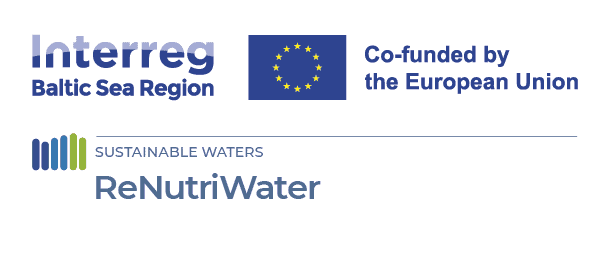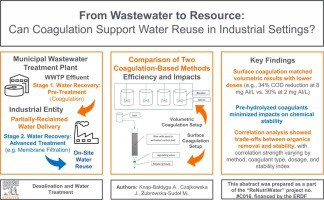
ReNutriWater Research Advances Water Reuse for Industry with Efficient Coagulation Methods
04 June 2025
The research titled “Coagulation in municipal water reclamation for industrial reuse: The process effectiveness and impact on chemical stability” and published in Desalination and Water Treatment, explores how different treatment techniques can clean municipal wastewater and make it safe and stable enough to be used again in factories and industrial plants.
The study, conducted by Alicja Knap-Bałdyga, Justyna Czajkowska, and Monika Żubrowska-Sudoł from the university’s Department of Water Supply and Wastewater Treatment, focuses on a process called coagulation. This water reclamation pre-treatment method helps remove unwanted substances from water by clumping them together so they can be more easily filtered out.
Cleaning Water with Less Effort
The researchers compared two coagulation methods and found that a simpler, more efficient approach called surface coagulation, can achieve the same level of purification while using fewer chemicals. For instance, nearly the same amount of pollutants was removed using just a quarter of the chemical dose compared to the traditional method.
This is especially valuable when turning treated wastewater into water clean enough for use in industrial applications such as cooling, processing, or cleaning.
Protecting Infrastructure
In addition to cleaning performance, the study also examined how these treatments affect the chemical balance of water, which plays a key role in preventing rust or mineral buildup inside pipes and machines. Some treatments improved purification but also made the water more corrosive. Others were more balanced, maintaining chemical stability even at higher doses.
Finding the Right Balance
The research highlights an important consideration: the coagulant choice must balance purification efficiency with long-term safety for infrastructure. Using too much of certain chemicals may increase purification but can also raise the risk of damage to industrial systems. The study shows that with careful selection of treatment methods and materials, it is possible to achieve both goals.
Moving Toward Sustainable Water Use
Conducted as part of the ReNutriWater project and supported by the European Union’s Interreg Baltic Sea Region Programme funding, and Warsaw University of Technology’s Excellence Initiative (IDUB), the study provides valuable guidance for designing smarter, more sustainable water reuse systems.
As industries search for reliable and eco-friendly water sources, findings like these help close the gap between laboratory research and real-world applications, making water recycling not only more efficient, but also safer and more practical.
Read the full research article here.






